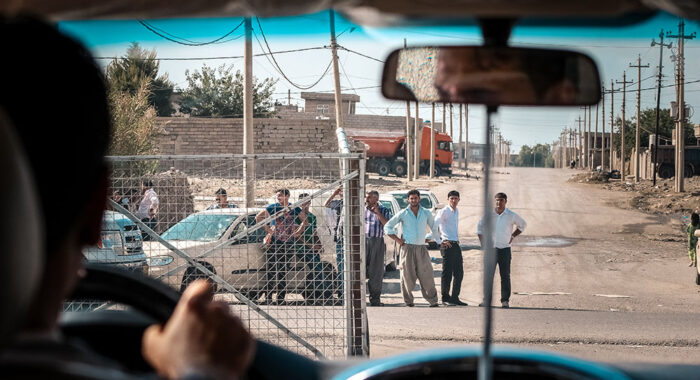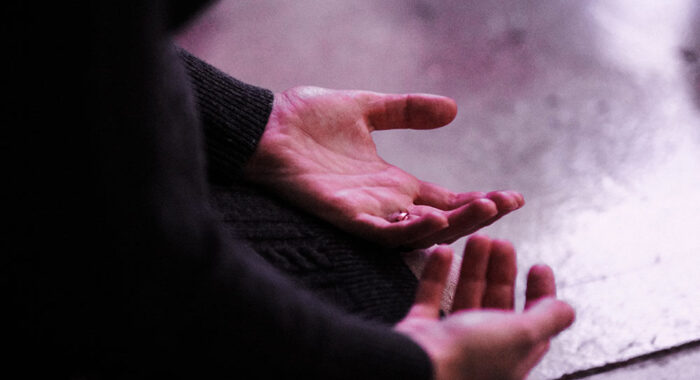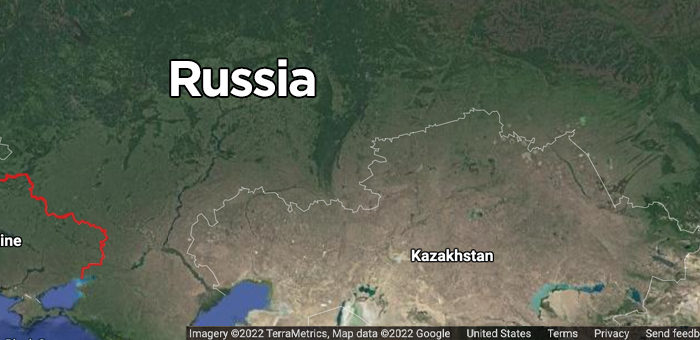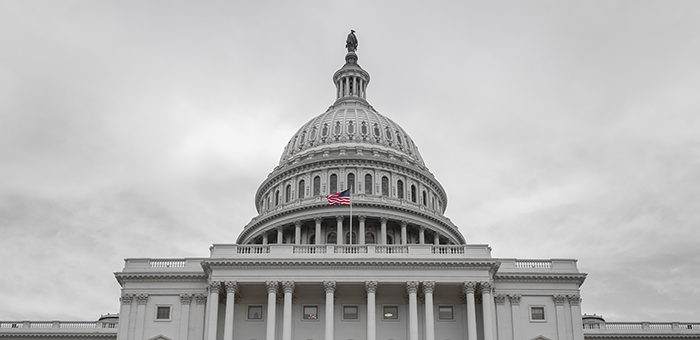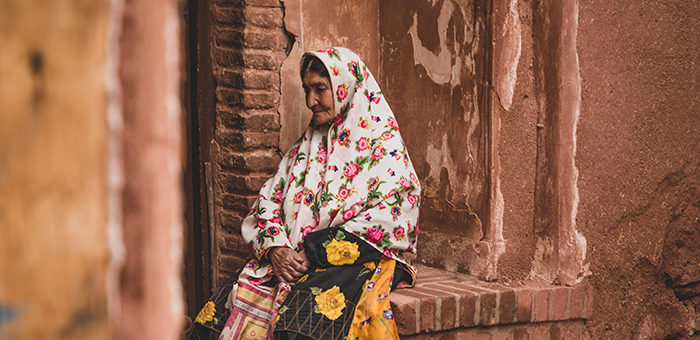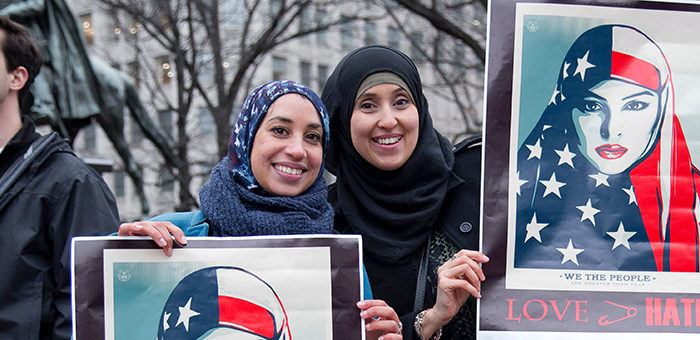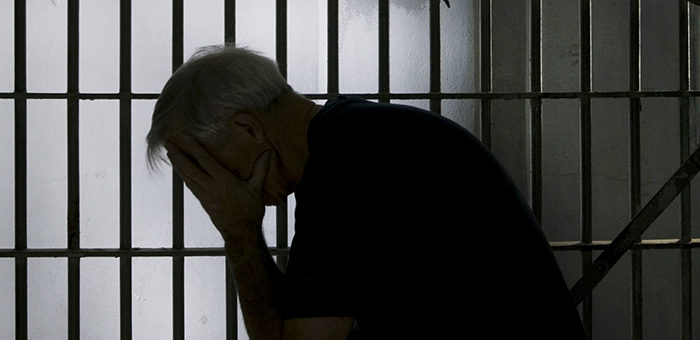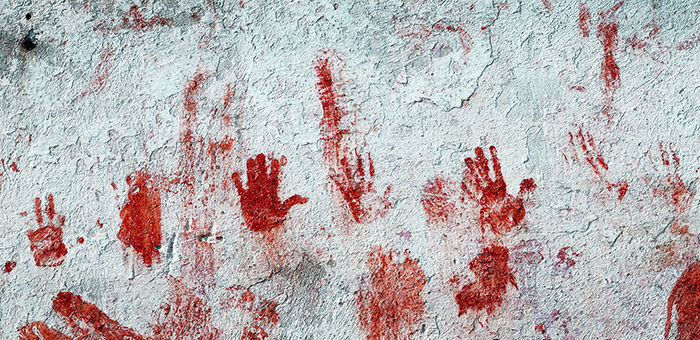Protecting Human Rights in an Age of Terror
The National Association of Evangelicals Board of Directors adopted this statement in 2007.
Executive Summary
- Introduction: From a Christian perspective, every human life is sacred. As evangelical Christians, recognition of this transcendent moral dignity is non-negotiable in every area of life, including our assessment of public policies. This commitment has been tested in the war on terror, as a public debate has occurred over the moral legitimacy of torture and of cruel, inhuman, and degrading treatment of detainees held by our nation in the current conflict. We write this declaration to affirm our support for detainee human rights and our opposition to any resort to torture.
- Sanctity of Life: We ground our commitment to human rights in the core Christian theological conviction that each and every human life is sacred. This theme wends its way throughout the Scriptures: in Creation, Law, the Incarnation, Jesus’ teaching and ministry, the Cross, and his Resurrection. Concern for the sanctity of life leads us to vigilant sensitivity to how human beings are treated and whether their God-given rights are being respected.
- Human Rights: Human rights, which function to protect human dignity and the sanctity of life, cannot be cancelled and should not be overridden. Recognition of human rights creates obligations to act on behalf of others whose rights are being violated. Human rights place a shield around people who otherwise would find themselves at the mercy of those who are angry, aggrieved, or frightened. While human rights language can be misused, this demands its clarification rather than abandonment. Among the most significant human rights is the right to security of person, which includes the right not to be tortured.
- Christian History and Human Rights: The concept of human rights is not a “secular” notion but instead finds expression in Christian sources long before the Enlightenment. More secularized versions of the human rights ethic which came to occupy such a large place in Western thought should be seen as derivative of earlier religious arguments. Twentieth century assaults on human rights by totalitarian states led to a renewal of “rights talk” after World War II. Most branches of the Christian tradition, including evangelicalism, now embrace a human rights ethic.
- Ethical Implications: Everyone bears an obligation to act in ways that recognize human rights. This responsibility takes different forms at different levels. Churches must teach their members to think biblically about morally difficult and emotionally intense public issues such as this one. Our own government must honor its constitutional and moral responsibilities to respect and protect human rights. The United States historically has been a leader in supporting international human rights efforts, but our moral vision has blurred since 9/11. We need to regain our moral clarity.
- Legal Structures: International law contains numerous clear and unequivocal bans on torture and cruel, inhuman, and degrading treatment. These bans are wise and right and must be embraced without reservation once again by our own government. Likewise, United States law and military doctrine has banned the resort to torture and cruel and degrading treatment. Tragically, documented acts of torture and of inhumane and cruel behavior have occurred at various sites in the U.S. war on terror, and current law opens procedural loopholes for more to continue. We commend the Pentagon’s revised Army Field Manual for clearly banning such acts, and urge that this ban extend to every sector of the United States government without exception, including our intelligence agencies.
- Concluding Recommendations: The abominable acts of 9/11, along with the continuing threat of terrorist attacks, create profound security challenges. However, these challenges must be met within a moral and legal framework consistent with our values and laws, among which is a commitment to human rights that we as evangelicals share with many others. In this light, we renounce the resort to torture and cruel, inhuman, and degrading treatment of detainees, call for the extension of procedural protections and human rights to all detainees, seek clear government-wide embrace of the Geneva Conventions, including those articles banning torture and cruel treatment of prisoners, and urge the reversal of any U.S. government law, policy, or practice that violates the moral standards outlined in this declaration.
- Introduction
1.1 The sanctity of human life, a moral status irrevocably bestowed by the Creator upon each person and confirmed in the costly atoning sacrifice of Christ on the Cross, is desecrated each day in many ways around the globe. Because we are Christians who are commanded by our Lord Jesus Christ to love God with all of our being and to love our neighbors as ourselves (Mt. 22:36-40), this mistreatment of human persons comes before us as a source of sorrow and a call to action.
1.2 All humans who are mistreated or tormented are somebody’s brothers and sisters, sons and daughters, parents and grandparents. We must think of them as we would our own children or parents. They are, by Jesus’ definition, our neighbors (Lk. 10:25-37). They are “the least of these,” and so in them and through them we encounter God himself (Mt. 25:31-46). “When human lives are endangered, when human dignity is in jeopardy, national borders and sensitivities become irrelevant,” Elie Wiesel declares. “Silence encourages the tormentor, never the tormented.”[1]
1.3 However remote to us may be the victim of torture, abuse, or mistreatment, Christians must seek to develop the moral imagination to enter into the suffering of all who are victimized. Having personally witnessed the horrors of the Cambodian genocide of the 1970s, Robert A. Evans writes: “The motivation of basic human rights can never again become a matter of statistics, or theory, or strategy, or legislation, or judicial decision. It will always be, for me, the violation of the dignity of other children of God.”[2] Commitment to a transcendent moral vision of human dignity which is rooted in the concrete reality of particular suffering human beings motivates the signers of this statement as well.
1.4 The authors and signatories of this declaration are evangelical Christians and citizens of the United States. As Christians, we long to obey the moral demands of our faith as articulated in the Scriptures. We seek to serve Jesus Christ, who alone is Lord of our lives, of the church, of our nation, and of the world. As citizens, we bring our Christian convictions to bear on the most important matters that arise in the life of our democracy, for the health of our nation and its impact on the lives of people around the world. We know that we may not always succeed in shaping the laws and policies of the United States in the way we believe they should be shaped. But we must, on all occasions, attempt to bear faithful Christian moral witness.
1.5 The immediate occasion for this declaration is the intense debate that has occurred in our country since 2004 over the use of torture and cruel, inhuman, and degrading treatment of those who are detained by our nation and other nations in the “war on terror.”[3] In 2005-2006 this debate evolved into a broader discussion of policies related to the legal standards that would be employed in detaining, trying, transferring, or punishing suspected terrorists in what is turning out to be a lengthy struggle against individuals and groups engaged in terrorist plots and acts against our nation.
1.6 This cluster of issues would not have arisen if not for the horrifying and heinous attacks of 9/11, which took nearly 3,000 lives and constituted a mass violation of the very moral standards we witness to in this declaration. The U.S. response to these attacks, including intensified intelligence activities, the invasion of Afghanistan, and later the much-debated invasion of Iraq, has led to the apprehension of thousands of “enemy combatants,” terrorists, suspected terrorists, and others. The question we now face is how we protect our society (and other societies) from further terrorist acts within a framework of moral and legal norms. As American Christians, we are above all motivated by a desire that our nation’s actions would be consistent with foundational Christian moral norms. We believe that a scrupulous commitment to human rights, among which is the right not to be tortured, is one of these Christian moral convictions.
The Sanctity of Human Life
“And God said, ‘Let us make human beings in our image, in our likeness. …So God created human beings in his own image, in the image of God he created them; male and female he created them.” Genesis 1:26a, 27
2.1 We ground our commitment to human rights, including the rights of suspected terrorists, in the core Christian belief that human life is sacred. Evangelicals join a vast array of other Christian groups and thinkers—Roman Catholics, mainline Protestants, Eastern Orthodox, and others—in a long history of reflection and activism on behalf of this critical yet threatened moral conviction.
2.2 The sanctity of life is the conviction that all human beings, in any and every state of consciousness or self-awareness, of any and every race, color, ethnicity, level of intelligence, religion, language, nationality, gender, character, behavior, physical ability/disability, potential, class, social status, etc., of any and every particular quality of relationship to the viewing subject, are to be perceived as sacred, as persons of equal and immeasurable worth and of inviolable dignity. Therefore they must be treated with the reverence and respect commensurate with this elevated moral status. This begins with a commitment to the preservation of their lives and protection of their basic rights. Understood in all of its fullness, it includes a commitment to the flourishing of every person’s life.[4]
2.3 Christian belief in the sanctity of human life is rooted in themes that work their way through the entire biblical canon as well as much of Jewish, Christian, and Western moral thought. Rightly understood, the sanctity of life is a moral norm that both summarizes and transcends all other particular norms in Christian moral thought.
2.4 Scripture reveals that life is sacred. Humans, in particular, are given life by the breath of God (Gen. 2:7) and are made in the image of God (Gen. 1:26-28). The imago Dei serves as a common denominator for all of humanity. Every human being, therefore, deserves respect.
2.5 The sanctity of life is emphasized in legal and covenantal texts in Scripture. Murder is forbidden because human beings are made in the image of God; this theme is evident in the covenants both with Noah and with Moses (Gen. 9:5-6; Ex. 20:13). Everyone has a duty to conserve and respect human life (Gen. 9:5; 4:8-10, 15), and to accept responsibility for the life of their fellow humans (Gen. 4:9; Dt. 21:1-9). Human life is sacred because it is “precious” to God (Ps. 116:15) and must therefore be precious to us as well. The prophets remind Israel of the value of human life, especially life at its most vulnerable (Is. 1:17; Jer. 7:6; Zech. 7:10).
2.6 The incarnation (Jn. 1:1, 14) permanently and decisively elevates the value of human life. It reveals a God who is not dispassionate, but deeply moved by the brokenness of creation.[5] The incarnation demonstrates the extraordinary value God places upon human life. It also signifies a mysterious bridging of the gap between God and humanity. Henceforth, the human experience in its joys and sorrows is inscribed upon the very Person of God in a new way. Furthermore, the Holy Spirit participates in human pathos with groans and sighs too deep for words. The cries of the tortured are in a very real sense, then, the cries of the Spirit.
2.7 Jesus Christ, God-made-flesh, taught the dignity of human life and practiced it in his treatment of those around him. He reaffirmed the biblical commands which are intended to protect human life. He diagnosed the vicious patterns of sinful behavior that lead us to violate God’s commands, and the sickness of the heart and mind that lie behind that sinful behavior. He offered teachings amounting to transforming initiatives to enable us to obey God’s will. This is most clearly illustrated in his single largest block of teaching, the Sermon on the Mount (Mt. 5-7).
2.8 In his ministry, Jesus in all contexts treated persons as sacred in God’s sight. This was especially apparent in the way he treated the marginalized: women, the sick, the dead, the poor, people of bad reputation, children, and enemies of Israel such as tax collectors, Roman soldiers, and gentiles in general. He explicitly affirms the worth of human beings in his teaching (Lk. 12:24; Mt. 6:26; 12:11-12). He taught peacemaking rather than violence, and on the Cross forgave those who assisted in killing him. He also stood with both the Law and the prophets before him in condemning injustice in its various forms: economic, political, military, and religious (cf. Mt. 23). The justice teachings of Jesus are closely related to a commitment to life’s sanctity and serve as a fundamental building block of a Christian commitment to human rights.
2.9 For many centuries, Jesus’ teaching about the “least of these” (Mt. 25:31-46) has been especially significant for shaping a Christian moral vision of the sanctity of every human life. Not only does this familiar “sheep and goats” parable emphasize the centrality of practical deeds of service to the least, the last, and the lost, it also teaches us to see Jesus in the hungry, the stranger, the naked, the sick, and the imprisoned: “as you did it unto the least of these, you did it unto me” (Mt. 25:40). This dramatic shift of moral vision has profound implications for how we as Christians think about our nation’s imprisoned, sometimes hungry, sometimes sick, sometimes naked strangers.
2.10 Ultimately, it is the Cross of Jesus Christ that demonstrates how much God values human life. God-in-flesh dies, at human hands, for human beings who do not love him and are not worthy of his costly sacrifice. “While we were yet sinners, Christ died for us.” Radical human equality is emphasized in the reason for this death, the universality of its scope, and the equality of its impact. At the Cross and in the Resurrection, by saying no to his Son’s cry of dereliction, God says yes to all of derelict humanity.
2.11 Considered etymologically, a sacred thing is something that has already been sanctified, dedicated, consecrated, venerated, or hallowed. One might say, then, that our holy God has transferred his holiness onto us and therefore sanctified each person. This confers upon each of us a dignity that our attitudes, attributes, and activities neither deserve nor can nullify.[6]
2.12 In his Gospel of Life, Pope John Paul II asserts the sacred value of human life “from its very beginning until its end.” He urges a fight against “the culture of death” and a holistic and comprehensive struggle to protect vulnerable humans, sacred in God’s sight.
2.13 John Paul II is among those who have made the connection explicit: the concept of human rights is inextricably bound to the belief that human life is sacred and therefore must be held in the highest respect. “Upon the recognition of this right, every human community and the political community itself are founded.”[7] Indeed, by focusing on human rights, we direct our attention and energy to those who need it most—those image-bearers whose dignity is being violated.[8] Human rights are not first of all about “my rights,” but about the rights of the vulnerable and the violated. And they are about responsibility, indeed obligation, to defend the weak. All people, all societies, and all nations have a responsibility to ensure human rights.
2.14 We believe that a commitment to human rights is strengthened profoundly by the kinds of theological commitments just articulated. They are certainly our convictions. We are very happy to work with persons of other faiths and no faith on behalf of human rights, but as evangelicals our convictions are rooted in God’s love and the dignity it gives to all human beings.
- Human Rights
“Defend the weak and the fatherless; uphold the cause of the poor and the oppressed. Rescue the weak and the needy.” Psalms 82:3-4a
3.1 Human rights function to protect the dignity of human life.[9] Because human rights guard what God has made sacred, they cannot be cancelled by any other concern, nor can they be bracketed off as irrelevant in exigent circumstances. This is in contrast to the view that a right can be cancelled or overridden. Human rights are a decisive factor in determining how all persons must be treated in all circumstances.[10] Rights correlate with duties—fundamentally, a duty to protect those whose God-given rights are about to be, or are being, violated.[11] Those who affirm a belief in human rights implicitly accept for themselves a range of moral obligations.[12] Affirmation of human rights and their corresponding duties is an important dimension of Christian belief, and also widely shared by persons of other faiths.
3.2 Human rights place a shield around people, even when (especially when) our hearts cry out for vengeance. It is precisely when we are most inclined to abandon a commitment to human rights that we most need to reaffirm that commitment.[13] The creation of a social order in which such legal and moral norms are honored even in the teeth of popular sentiment is both a high human achievement, and a fragile one.
3.3 Human rights apply to all humans. The rights people have are theirs by virtue of being human, made in God’s image. Persons can never be stripped of their humanity, regardless of their actions or of others’ actions toward them. In social contract theory human rights are called unalienable rights. Unalienable rights are absolute and completely inviolable; a person cannot legitimately cease to have those rights, whether through waiver, fault, or another’s act.[14] This is not biblical vocabulary, but it does seem to us consistent with a biblical understanding of human rights. Consider the way in which even Cain was protected by the divine “mark,” and legal provision to protect the rights of killers was made in the Old Testament through the cities of refuge and the processes of judgment required there (Num. 35:9-34).
3.4 Some Christians reject human rights language because they have witnessed its abuse. They have heard numerous groups claim a right to engage in certain behaviors as expressions of their human rights. Many morally troublesome agendas are punctuated with “rights-talk,” thereby cheapening those rights that are indeed both unalienable and threatened.[15] But the solution is not to abandon talk of rights. It is instead to clarify the range of legitimate rights-claims.
3.5 A variety of approaches can be taken to articulate and organize claims about human rights. An expansive approach argues that there are three dimensions of human rights, and all must be equally valued by any society that respects any of them: the right to certain freedoms, especially including religious liberty, the right to participate in community, and the right to have basic needs met. [16]
3.6 If one takes a more constrained approach to human rights, such as the view which confines human rights to “negative rights,” i.e., that which the state may not do to us, the issues under discussion in this declaration still fall well within the boundaries of legitimate human rights-claims.
3.7 Human life is expressed through physicality, and the well-being of persons is tied to their physical existence. Therefore, humans must have the right to security of person. This includes the right not to have one’s life taken unjustly (equivalent to the right to life), the right not to have one’s body mutilated, and the right not to be abused, maimed, tortured, molested, or starved (sometimes called the right to bodily integrity or the right to remain whole). The right not to be arbitrarily detained (an aspect of due process) and the writ of habeus corpus are also based specifically on the concept of bodily rights. In particular, the writ of habeus corpus is based on the right not to have the government arbitrarily detain one’s body.
- The Christian History of Human Rights
“Thus says the Lord: ‘Do justice and righteousness, and deliver from the hand of the oppressor him who has been robbed. And do no wrong or violence to the alien, the fatherless, and the widow, nor shed any blood.”
Jeremiah 22:3
4.1 Contrary to a common misunderstanding, one that has weakened Christian support for human rights, human rights are not an Enlightenment notion, and certainly not to be seen as an Enlightenment fiction. Rooted in Scripture, the concept of human rights was suggested as far back as the 12th century, and can be traced into the modern period through a variety of routes, all of them versions of Christianity. Heirs to the English Christian traditions find especially important the work of Richard Overton, an English Christian thinker of the 17th century. In 1645, Overton wrote The Arraignment of Mr. Persecution, basing his argument on reason, experience, and Scripture. The book was penned during a time of great oppression of religious nonconformists in England. Overton proclaimed the equal rights of Jews, Muslims, atheists, Catholics, Protestants, and all humankind.[17]
4.2 Thus human rights ideas developed in the English-speaking world during a movement for religious liberty among “free church” Puritans in England, and later among religious dissenters in North America like Roger Williams, and not first among Enlightenment rationalists.[18] The concept of human rights flourished in the 17th and 18th centuries with documents such as the American Declaration of Independence (1776), the French Assembly’s Declaration of the Rights of Man and of the Citizen (1789), and Thomas Paine’s The Rights of Man expressing the belief in “natural rights.”[19] More secularized versions of human rights should be seen as derivatives of an earlier, explicitly Christian, articulation.
4.3 The late 19th century proved an inhospitable environment for belief in “natural rights” worldwide, in both philosophical and political arenas. However, the totalitarian assault on human dignity in the first half of the 20th century, especially by Nazi Germany, Stalinist Russia, and Imperialist Japan, led to a reinterpretation of traditional natural-rights talk in the direction of “human rights.”[20] Reacting to the devastation of the Nazi regime, and responding to the struggle by colonies for independence from their colonial masters, human rights gained worldwide momentum once again. Shortly after World War II, the United Nations Declaration of Human Rights was written, and then signed by the vast majority of nations.[21] The United States played a key role in drafting and advancing this UN Declaration. Many deeply committed Christians were involved in this process. Evangelicals struggled with the secular grounding of the Declaration’s norms, but both then and now embrace its primary principles.
4.4 The Roman Catholic Church and the second Vatican Council (1962-1965) brought about another development in the maturation of the concept of human rights. Strongly affirming religious liberty after centuries of teaching otherwise, the Vatican II leaders, as with Overton, articulated strong concern for world peace and drew the connections between war and the violation of human rights. [22] A similar emphasis on human rights appears in many of the documents of the global ecumenical movement, as well as mainline Protestant theologians such as Reinhold Niebuhr. Meanwhile, the social movement of the 1950s and 1960s for African-American civil rights provided a powerful articulation of a heartfelt human rights ethic. It is hard to avoid the conclusion that an emphasis on human rights was very nearly a Christian consensus by the late 20th century.
4.5 Yet talk of human rights evokes opposition as well. We have already noted theological and philosophical objections. But throughout history the primary opposition to a concept of human rights has emerged most intensely from privileged groups (religious, economic, political, ethnic, etc.) determined to maintain their unjust advantages or resist challenges to their mistreatment of those whom they dominated. Meanwhile, support for human rights has helped to spread democracy and in general to break the power of unjust social structures.[23]
4.6 Love for one’s neighbor should motivate the believer to act in the interests of those whose rights we are responsible to defend. Commitment to human rights can be seen as a systematic way to look out for the interests of others, and thus as an expression of Christian love. This is now the overwhelming consensus of the Christian community.
- Ethical Implications of Human Rights
“Father to the fatherless, a defender of widows, is God in his holy dwelling. God sets the lonely in families, he leads out the prisoners with singing.” Psalms 68:5-6
Principles
5.1 It is vital for the future of any good society and for the development of democracy that we, as citizens of the United States and as Christians belonging to the Body of Christ, promote and protect the innate dignity of the human person and therefore honor human rights. In the last century we have witnessed far too many attempts to abolish that divine value in humanity, and to treat human beings in ways far worse than bestial. However, as Pope John Paul II stated, the sanctity of life is a value “which no individual, no majority and no State can ever create, modify or destroy, but must only acknowledge, respect and promote.”[24]
5.2 Even when a person has done wrong, poses a threat, or has information necessary to prevent a terrorist attack, he or she is still a human being made in God’s image, still a person of immeasurable worth. The crime we abhor, but we must distinguish the error from the person in error. A person might do inhuman acts, but is never inhuman.[25] This distinction is excruciatingly difficult to make, which is all the more reason why we must be vigilant in doing so.
Responsibilities
Individual Responsibility
5.3 As individuals we are responsible for protecting the dignity of others, as the Good Samaritan did when he went out of his way to minister to the victim he found along his path (Lk. 10:25-37). The Lord brings justice, and governments have resources not available to individuals, but that does not release each of us from the obligation to make an urgent and concerted effort to raise every bearer of the image of God to the dignified level at which he or she was intended by the Creator.[26]
5.4 We live in a free society, a representative democracy, and while only a few may be direct perpetrators of human rights violations or even torture, we all share the responsibility because we are the citizens on whose behalf interrogators and military personnel are working. Whether we commit an offense against humanity, or simply sin by refusing to speak up for someone who is being victimized, as individuals and a society we are accountable for the indignities that are authorized and carried out by our nation.[27] We each have responsibility to exercise our right/obligation to participate in the deliberative processes of our democracy. Those who have greater social or political power have even greater moral responsibility to act.
The Role of the Church
5.5 The churches have a very important responsibility to prepare their members to be faithful disciples of Christ who witness in and to the various contexts in which we find ourselves. Church leaders have a critical role in equipping Christians to think and respond biblically in all major areas of life, including the one we are considering here. One aspect of this discipling process is to help congregants prepare for the exercise of their citizenship responsibilities. Evangelicals alone make up one quarter of all voters in the United States. As evangelicals we are keenly aware of the gravity of our responsibility, and many of us have joined in articulating our own public ethical vision in a document released in 2004, and endorsed by all forty-three members of the Board of the National Association of Evangelicals, “For the Health of the Nation.”[28]
The Role of the State
5.6 The government inevitably plays a central role in a nation’s treatment of human beings and respect for human life. Unless human rights are embedded in a nation’s constitutional documents, in its legislation, and in fair court procedures, and there is governmental respect for international laws that protect human rights, rights-claims can become mere abstractions that are not implemented in practice. In light of the sinfulness of humanity there is a need for the protection and restraint of laws.
5.7 Governments should be legally obligated to protect basic human rights. The U.S. government certainly is so obligated.
5.8 It is striking that calls in the 1970s and 1980s for the U.S. to advance global human rights initially assumed that human rights were an unquestioned part of our own constitutional order. The idea was to spread that vision around the world. Evangelicals have been deeply invested in that project. We have pressed for the rights of religious liberty, especially where religious minorities have been persecuted, for the rights of victims of sex trafficking, and for human rights in countries oppressed by dictatorships. Now we find ourselves having to turn our gaze homeward again, to the eroding human rights protections of our own practices.
5.9 The goal of a nation that advances human rights for all is one that has been articulated by our current president and members of his administration. President George W. Bush has described the United States as being born from a “simple dream of dignity.” [29] The American spirit, he has asserted, is “generous and strong and decent, not because we believe in ourselves, but because we hold beliefs beyond ourselves.”[30]
5.10 This dream was not lost after 9/11. On October 31, 2001, Lorne W. Craner, Assistant Secretary for the Bureau of Democracy, Human Rights, and Labor, stated: “maintaining the focus on human rights and democracy worldwide is an integral part of our response to the attack [on 9/11]. … We are proud to bear the mantle of leadership in international human rights in this century.” [31] President Bush’s speeches are full of belief in the dignity of every human life, regardless of political or national distinctions. “The American flag stands for more than our power and our interests,” he has said. “Our founders dedicated this country to the cause of human dignity, the rights of every person, and the possibilities of every life.” [32]
5.11 In light of these appealing words, it is clear to us that the terrorist attacks that jolted the nation in 2001 have blurred our national moral vision. National resolve, normally a virtue, can be misdirected, leading to the violation of human rights when it is allowed to overthrow our better selves. As the founding fathers intended, we have checks and balances within our Constitution’s framework where Congress and the courts operate to check the presidency and thereby protect human rights. This is how it should be. Meanwhile, the United Nations Human Rights Charter and the great number of other human rights documents to which America has added its name serve as additional boundary-setters, so that the government does not act rashly or unjustly.
5.12 The current administration has at times used language that is rich with respect for human rights, even after 9/11. Today this language is less frequently heard, and our actions as a nation do not consistently reflect the values once articulated. Yet there is a structure of national and international principles and laws that can help us to regain our moral footing, and in some ways have already begun to do so.
- Legal Structures regarding Human Rights
“A ruler who lacks understanding is a cruel oppressor, but he who hates unjust gain will prolong his days.” Proverbs 28:16
International Law
6.1 The Geneva Conventions, the Universal Declaration of Human Rights, and many other treaties outlining human rights are in place so each signatory nation is held accountable.
6.2 With a raging “war on terror,” American policymakers and interrogators have faced the temptation of looking to torture, and to cruel, inhuman, or degrading treatment of their detainees in Iraq, Afghanistan, Guantánamo, and other U.S. detention centers. Torture has often been a temptation (and far too many times a practice) in other countries facing perceived or actual security threats. Despite these abuses, the articles of the Geneva Convention and of the Universal Declaration on Human Rights are unambiguous.[33]
6.3 Article 3 of the 3rd Geneva Convention (1949) says:
Persons taking no active part in hostilities … shall in all circumstances be treated humanely, without any adverse distinction founded on race, colour, religion or faith, sex, birth or wealth, or any other similar criteria. To this end the following acts are and shall remain prohibited at any time and in any place whatsoever with respect to the above-mentioned persons: violence to life and person, in particular, humiliating and degrading treatment; an impartial humanitarian body, such as the international committee of the Red Cross, may offer its services to the Parties in conflict.[34]
6.4 Article 5 of the same Geneva Convention states: “No one shall be subjected to torture or to cruel, inhuman, or degrading treatment or punishment.” Article 9 reads: “No one shall be subjected to arbitrary arrest, detention, or exile.”[35] The U.N. International Covenant on Civil and Political Rights (ICCPR–1966) states in article 7 that “no one shall be subjected to torture or to cruel, inhuman or degrading treatment or punishment.” Article 10 of the ICCPR also establishes a particular right to be treated in a humane and dignified manner for accused or detained persons deprived of their personal liberty.[36] This code of conduct is further clarified in the United Nations High Commission on Human Rights Civil and Political Rights, Including the Questions of Torture and Detention (2005). According to the Geneva Conventions, cruel, inhuman, or degrading treatment (CIDT), although falling short of torture, is still completely prohibited along with all forms of torture. “The overriding factor at the core of the prohibition of CIDT is the concept of [the] powerlessness of the victim.”[37]
6.5 International treaties provide no loopholes for justifying torture or any form of degrading treatment. The ICCPR treaty says that although “in time of public emergency which threatens the life of the nation … the State Parties to the present Covenant may take measures derogating from their obligations under the present Covenant to the extent strictly required by the exigencies of the situation, … no derogation from [article] 7… may be made under this provision.”[38] The U.N. Convention Against Torture puts it this way: “No exceptional circumstances whatsoever, whether a state of war or a threat of war, internal political instability or any other public emergency, may be invoked as a justification for torture.”[39]
6.6 The United States is a signatory to all of these international treaties. We have also historically incorporated their principles into military doctrine. However, these practices have come into question during the last five years. We believe that this has been a mistake, and we support a return to full adherence to the straightforward meaning of international conventions against torture.
U.S. Law
6.7 The United States has often sought to position itself as being on the side of the oppressed, including soldiers imprisoned under unjust or cruel circumstances. During the American Revolution, our soldiers were mistreated by the British. Our nation has worked diligently since then to provide legal protection to any person in the custody of the enemy through laws of war.[40] The Geneva Conventions and the Additional Protocols of 1977 are the most recent version of this protection. In 1996, the United States adopted the War Crimes Act to make it possible for our courts to enforce the Conventions, and so the U.S. had entered into enforceable compliance with these vital international safeguards.[41] It must be remembered that the United States has historically been a leader in pressing for such safeguards, not just a reluctant signatory.
6.8 Since human rights first became a prominent issue in the 20th century, the United Nations and the United States have continued to make additions to former agreements, treaties, and statements in order to make them as comprehensive and relevant as possible. This is what a democracy should always be doing. Human rights have always been, and always will be, under attack. However, a democracy works to guard against such violations of human rights through its laws. Its very identity depends upon the confidence that violations of human rights, such as torture, are prohibited.[42]
6.9 Between 9/11 and January 2006, tens of thousands had been detained in U.S. detention centers.[43] The vast majority of these detainees were released without charge. It is important to remember that detention policies pertain to persons, most of whom will end up being charged with no crime and being viewed as no threat to our nation.
6.10 The boundaries of what is legally and morally permissible in war have been crossed in the current “war on terror.” The evidence of acts of torture or cruel, inhuman, and degrading treatment against U.S. detainees, especially in Iraq’s Abu Ghraib prison, in Afghanistan’s Bagram Air Base, in CIA black sites, and at the hands of other nations, has been documented by numerous researchers, including those serving the U.S. government itself. Revelations of these outrages against human dignity led to intense pressure on the federal government to return to its earlier rejection of torture and to clarify its detention and interrogation policies.
6.11 Commendably, the U.S. Army Field Manual, last revised in 1992, has recently undergone more changes in light of recent events. Specific cruel, inhuman, and degrading practices that had taken place at least sporadically from 2002-2006 are now overtly banned. In addition to the general language of the 1992 edition, which prohibited “acts of violence or intimidation, including physical or mental torture, threats [or] insults, … as a means of or aid to interrogation,”[44] there is now also more specific wording prohibiting military personnel from engaging in the behavior that put Abu Ghraib in the headlines. Beating prisoners, sexually humiliating them, threatening them with dogs, depriving them of food and water, performing mock executions, shocking them with electricity, burning them, causing other types of pain, and “waterboarding,” are all explicitly banned.[45] The Pentagon is to be commended for this strong and positive revision of the Army Field Manual. It should become the policy of every agency of the United States government.[46]
6.12 Tragically, however, despite the military’s commendable efforts to remove itself from any involvement with torture, the current administration has decided to retain morally questionable interrogation techniques among the options available to our intelligence agencies. For some time it did so without any form of public disclosure or oversight. In 2006 the administration moved its policies more fully into the light of day, pressing for legislation to authorize what it wanted to do.
6.13 The most recent legislation regarding these issues was signed into law in October 2006.[47] From a human rights perspective, the Military Commissions Act includes numerous problematic provisions, such as one in which CIA officials are not required to submit to congressional oversight, and are not held to the same standards as the U.S. military. CIA “black sites” may continue to exist, with interrogation rules established by the president but not specified publicly and now removed from the ability of either Congress or judicial authority to review. [48] This could prove to be a recipe for cruel, inhuman, and degrading treatment of detainees, without the Constitution’s checks and balances so crucial for American justice.
6.14 Various procedural issues in the Military Commissions Act are also troubling. The new law does not allow terrorism suspects to challenge their detention or treatment through traditional habeas corpus petitions.[49] It permits prosecutors, under certain conditions, to use evidence collected through hearsay or through coercion to seek criminal convictions.[50] The legislation also rejects any right to a speedy trial,[51] and it empowers U.S. officials to detain indefinitely anyone it determines to have “purposefully and materially” supported anti-U.S. hostilities.[52] These provisions are deeply lamentable, in part because of their substance, and in part because they create the conditions in which further prisoner abuse is made more likely. They violate basic principles of due process that have been developed in Western judicial systems, including our own, for centuries. Anti-U.S. “hostilities” is a vague term that a future administration can use against anyone perceived as its enemy.[53] We see this as fraught with danger to basic human rights.
- Conclusion: Human Rights in an Age of Terror
“And the Lord said, ‘What have you done? The voice of your brother’s blood is crying to me from the ground.” Genesis 4:10
7.1 The terrorist attacks of 9/11 and the attacks that followed blatantly violated human rights in the most outrageous manner imaginable. We declare without hesitation that the terrorist attacks in New York, Washington, London, Madrid, Bali, Casablanca, Amman, and other locations around the globe were heinous assaults on human life. We condemn these worldwide terrorist activities and the radical ideologues that foment them.
7.2 It is certainly the responsibility of a nation’s government to protect its people from such callous and cruel disregard of human life.[54] Our military and intelligence forces have worked diligently to prevent further attacks. But such efforts must not include measures that violate our own core values.
7.3 Our current circumstances and national security concerns do not present us with distinctively new temptations regarding the violation of human rights in relation to interrogation policies, torture, and the legal rights of detainees. Our nation’s founders anticipated security threats in the 18th century; indeed, one could argue that they faced a far more threatening security environment than any that we have experienced since their age. Deterring evil ends without resorting to evil means are tasks in tension, but any democracy must face dealing with this tension.
7.4 A significant challenge presented to us as we focus on deterring terrorism is not that terrorism is unprecedented, but that as it spreads and intensifies, terrorism is deeply frightening to people and unsettling to our way of life. The principle that we must “discharge duties to those who have violated their duties to us” seems even more difficult to bear.[55] It also makes it all the more necessary to be vigilant about guarding those moral boundaries.
7.5 Torture is but one of many violations of human rights. Sadly there are more. Even forty years ago, Vatican II was able to list the following such violations:
The varieties of crime are numerous: all offenses against life itself, such as murder, genocide, abortion, euthanasia and willful suicide; all violations of the integrity of the human person, such as mutilation, physical and mental torture, undue psychological pressures, all offenses against human dignity, such as subhuman living conditions, arbitrary imprisonment, deportation, slavery, prostitution, the selling of women and children, degrading working conditions where men are treated as mere tools for profit rather than free and responsible persons: all these and the like are criminal: they poison civilization; and they debase the perpetrators more than the victims and militate against the honor of the creator.[56]
7.6 Slavery, human and sexual trafficking, genocide, prison rape, abortion, euthanasia, unethical human experimentation—these are some of the other human rights violations listed by the National Association of Evangelicals in its “For the Health of the Nation” statement of 2004.[57] As evangelicals, we are deeply concerned about all violations of human rights. We want to lead the way in honoring and defending human rights wherever they are threatened.
7.7 We gratefully acknowledge our brothers and sisters in other Christian traditions for their thoughtful and Spirit-led work in the area of human rights. In recent times, evangelicals have joined with others to articulate an increasingly vigorous human rights ethic. The Board of the National Association of Evangelicals, representing over 30 million evangelical Christians, in 2004 unanimously approved a statement of social responsibility, which declared that “because God created human beings in his image, we are endowed with rights and responsibilities. … Governments should be constitutionally obligated to protect basic human rights.” Among those rights articulated in this statement is the right to live “without fear of torture.”[58] Little did the NAE know how relevant that particular provision would soon become.
7.8 As evangelicals, we are first obligated to be faithful to Christ and his teaching. We are to be Kingdom people, disciples who think biblically about all things. In this particular situation, discipleship requires a clear word from us to our nation and its leaders. We must continue to discuss the moral problems associated with our treatment of detainees both in recent years and still today. Indeed, all citizens in a democracy must step up to the challenge we now face. The enormous burden of defending the human rights of United States citizens while also respecting those of the (suspected and actual) enemy is not one to be carried by our president alone.[59] As fellow Christians, fellow citizens, and fellow human beings, we let our leaders down by remaining silent.
7.9 When torture is employed by a state, that act communicates to the world and to one’s own people that human lives are not sacred, that they are not reflections of the Creator, that they are expendable, exploitable, and disposable, and that their intrinsic value can be overridden by utilitarian arguments that trump that value.[60] These are claims that no one who confesses Christ as Lord can accept.
7.10 The most widely publicized acts of torture by the U.S. came on the heels of the 9/11 attack. As our nation mobilized, the eyes of the Muslim world were on the U.S. and how a Western civilization – in their eyes a Christian civilization – would respond to such barbarism. In this setting, that our actions were not bound by principles of human rights that we in the West profess was rightly seen by Muslims as hypocrisy and thus all the more damaging.
7.11 Human rights must be protected for all humankind. A commitment to life’s sacredness and to human rights is a seamless garment. It cannot be torn anywhere without compromising its integrity everywhere.
7.12 Therefore:
(a) We renounce the use of torture and cruel, inhuman, and degrading treatment by any branch of our government (or any other government)—even in the current circumstance of a war between the United States and various radical terrorist groups.
(b) We call for the extension of basic human rights and procedural protections to all persons held in United States custody now or in the future, wherever and by whomever they are held.
(c) We call for every agency of the United States government to join with the United States military and to state publicly its commitment to the terms of the Geneva Conventions related to the treatment of prisoners, especially Common Article 3.
(d) We call for the legislative or judicial reversal of those executive and legislative provisions that violate the moral and legal standards articulated in this declaration.
7.13 We make these renunciations and calls for action as Christians and as U.S. citizens. Undoubtedly there are occasions where the demands of Christian discipleship and American citizenship conflict. This is not one of them. Returning to the absolute commitment to human rights outlined here is right in terms of Christian convictions and right in terms of the interests of our nation. We commend these moral commitments to our fellow believers, and our fellow citizens, for such a time as this.
[1] Wiesel, Elie. “Acceptance Speech for 1986 Nobel Peace Prize.” Oslo, December 10, 1986. http://www.nobelprize.org/nobel_prizes/peace/laureates/1986/wiesel-acceptance_en.html, Accessed February 4, 2015.
[2] Robert A. Evans and Alice Frazer Evans, Human Rights: A Dialogue Between the First and Third Worlds (Maryknoll, NY: Orbis Books, 1988), 3-4.
[3] We use quotation marks for this term because we are not convinced of the precision or cogency of a war on “terror,” which is at one level a tactic (terrorism) and at another level a feeling (terror). We do not use the term with quotation marks in order to downplay the significance of the terrorist acts that have been directed at other nations and our nation in the past two decades.
[4] David P. Gushee, The Sanctity of Life: A Christian Exploration (Grand Rapids: Eerdmans, forthcoming).
[5] IVP New Dictionary of Christian Ethics and Pastoral Theology, ed. David J. Atkinson, et al (Downers Grove, IL: Intervarsity Press, 1995) 757-758.
[6] Gushee, The Sanctity of Life, 3.
[7] Pope John Paul II, The Gospel of Life, (New York: Random House, Inc., 1995), 2-4.
[8] Glen Stassen, “Foreword,” in Christopher D. Marshall, Crowned with Glory and Honor: Human Rights in the Biblical Tradition, vol. 6, 11-14, Studies in Peace and Scripture (Telford, PA: Pandora Press U.S., 2001), 11.
[9] Per Sundman, “Human Rights, Justification, and Christian Ethics” (Ph. D. diss., Uppsala University, 1996), 41.
[10] Sundman, 45.
[11] Stassen, “Foreword,” 12.
[12] Christopher D. Marshall, Crowned with Glory and Honor: Human Rights in the Biblical Tradition, vol.6, Studies in Peace and Scripture (Telford, PA: Pandora Press U.S., 2001), 34.
[13]An example from another context helps illustrate our point. In 2000, a young teenage girl in New Zealand was abducted by a neighbor. She was sexually violated, and then buried alive. She died a horrible death. The murderer was tried, convicted, and imprisoned for life according to the laws of New Zealand, but this did not satisfy the girl’s stepfather. He was subsequently convicted for repeatedly hurling murderous threats at her killer. Hailed as a hero, the stepfather had overwhelming public opinion in his favor. One supporter said of the girl’s killer, “When you commit that kind of crime, you give up your rights. That kind of person is not even human.” A columnist for the New Zealand Herald, however, wrote in support of the judge’s decision. Criticizing the public’s lust for vengeance, he insisted that even the murderers of children “still have basic human rights and a decent society ensures those rights are upheld.”
[14] Sundman, 38, 44.
[15] Mary Ann Glendon, Rights Talk. New York: Free Press, 2004.
[16] Glen H. Stassen, Just Peacemaking: Transforming Initiatives for Justice and Peace (Louisville: Westminster/ John Knox Press, 1992), 138, 159.
[17] Christopher D. Marshall, 148.
[18] Michael Westmoreland White, “Setting the Record Straight: Christian Faith, Human Rights, and the Enlightenment,” Annual of the Society of Christian Ethics (1995), 75-96.
[19] Christopher D. Marshall, 29.
[20] Christopher D. Marshall, 29-30.
[21] Stassen, “Foreword,” 11-12.
[22] Stassen, Just Peacemaking, 156.
[23] Stassen, “Foreword,” 13.
[24] Pope John Paul II, 129.
[25] Vatican II: The Conciliar and Post Conciliar Documents, 64, Austin Flannery, O. P. ed., PASTORAL CONSTITUTION ON THE CHURCH IN THE MODERN WORLD, “Gaudium et Spes” (December 7, 1965), 929.
[26] Paul Marshall, “Human Rights,” Toward An Evangelical Public Policy, ed. Ronald J. Sider and Diane Knippers (Grand Rapids: Baker Books, 2005), 313.
[27] Evans and Evans, 3.
[28] “For the Health of the Nation,” in Toward an Evangelical Public Policy, ed. Ronald J. Sider and Diane Knippers, 363-375, (Grand Rapids: Baker Books, 2005), 363.
[29] Julie A. Mertus, Bait and Switch: Human Rights and U.S. Foreign Policy (New York: Routledge, 2004), 57.
[30] Mertus, 57.
[31] Mertus, 58
[32] Mertus, 58.
[33] David Gushee, “Against Torture: An Evangelical Perspective,” in Theology Today, 349-364, vol. 63, No. 3, (October 2006), 351.
[34] Geneva Convention (III): Relative to the Treatment of Prisoners of War (Geneva, 12 August 1949).
[35] Third Geneva Convention.
[36] Civil and Political Rights, Including the Questions of Torture and Detention, 13.
[37] United Nations High Commission on Human Rights, Civil and Political Rights, Including the Questions of Torture and Detention, United Nations Department of Public Record (Geneva, Switzerland, December 23, 2005), 13.
[38] International Covenant on Civil and Political Rights, United Nations General Assembly Resolution 2200A [XX1] (16 December 1966), accessible at http://www.cirp.org/library/ethics/UN-covenant (September 15, 2006); (italics added).
[39] David Gushee, “Five Reasons Torture is Always Wrong,” Christianity Today, (February 2006), accessed at www.christianitytoday.com/ct/2006/002/23.32.html, (September 3, 2006).
[40] David Gushee and Cliff Kirkpatrick, “Rights of Detainees Must Not Be Violated,” Commercial Appeal, (September 27, 2006).
[41] Gushee and Kirkpatrick.
[42] Michael Ignatieff, “Evil Under Interrogation,” Financial Times (London, May 15, 2004).
[43] Katherine Shrader, “U.S. Has Detained 83,000 in War on Terror,” Associated Press, November 16, 2005, accessed online at www.sunherald.com, 11/25/05.
[44] Gushee, “Five Reasons.”
[45] “Human Intelligence Collector Operations.” U.S. Army Field Manual 2-22.3. September 6, 2006.
[46]The U.S. has a moral obligation to train our military personnel in the best way to meet combat contingencies. That necessitates tough training in survival, escape, evasion, and rescue techniques. Also, history demonstrates that our enemies often do not observe standards of international law or the Geneva Convention. Therefore, part of military training involves sleep deprivation, exhaustive marches, food deprivation, and even some pain or discomfort. While this training is closely monitored to guard against abuses, it also must be sufficiently rigorous to arm the individual with physical, psychological, and mental coping skills to endure the unimaginable if taken as a prisoner of war. The signatories understand that this is part of military training and do not intend to condemn it.
[47] Military Commissions Act of 2006, 120 Statutes at Large 2600, Public Law 109-366 (October 17, 2006). Many of the act’s sections are codified at title 10 United States Code section 948a and following.
[48] President George W. Bush, in a speech made at the signing of the Military Commissions Act of 2006, Washington, D.C., October 17, 2006.
[49] Section 7 of the Military Commissions Act, title 28 United States Code section 2241.
[50] Section 3 of the Military Commissions Act, title 10 of the United States Code section 948r and section 949a.
[51] Section 3 of the Military Commissions Act, title 10 United States Code 948b.
[52] Section 3 of the Military Commissions Act, title 10 of the United States Code section 948a
[53] Section 3 of the Military Commissions Act, title 10 of the United States Code section 948a.
[54] The majority of the signatories of this document stand in the just-war tradition. Those who are pacifists believe government should carry out its important responsibilities using non-lethal methods.
[55] Ignatieff.
[56] Vatican II, 928.
[57] “For the Health of the Nation,”363, 370.
[58] “For the Health of the Nation,” 373.
[59] Haugen.
[60] Ignatieff.



 View All Updates
View All Updates 